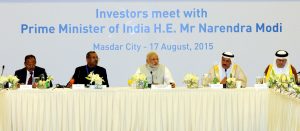A few weeks ago, India’s Chief Justice N.V. Ramana argued in London that India can become a favored destination for global investment because of its independent judiciary and rule of law. Only a few days later, that theory was put to the test in the restive state of Uttar Pradesh: There, in the capital city of Lucknow, a sprawling new mall built by a noted Indian Muslim businessman, Yusuff Ali, was subjected to a spate of Hindu nationalist attacks.
Ali’s Lulu Group — which has built a significant footprint in the Middle East over the last few decades — had brought in a massive investment of over $250 million and as many as 15,000 jobs with its new mall in Lucknow. Yet, shortly after the mall was inaugurated by Chief Minister Yogi Adityanath, Hindu nationalist groups claimed that 70 percent of the staff is Muslim.
When that charge was refuted by the mall’s management, a video surfaced, showing a handful of people offering Muslim prayers in a corner of the mall. Soon, Hindu nationalists retaliated by reciting Hindu chants in response.
It wasn’t merely Hindu nationalists who wanted a slice of the controversy. Last week, Muslim leader Azam Khan of the opposition Samajwadi Party claimed that Yusuff Ali is a fundraiser for the Hindu nationalist Rashtriya Swayamsevak Sangh (RSS) — widely seen as the ideological fountainhead of the ruling Bharatiya Janata Party (BJP). Khan further said that Ali “wants to create communal violence in the state.”
The series of controversies — all taking place in less than a month since the mall’s opening — starkly highlighted the significant long-term challenge facing India’s efforts to become a global investment destination.
In the last fiscal year, India benefited from a record high inflow of foreign direct investment (FDI) — to the tune of almost $80 billion. Prime Minister Narendra Modi’s government credited that to its “liberal and open” FDI policy. Yet, in more recent times, a rapidly weakening rupee, inflation fueled by the war in Ukraine, and rising interest rates in the West could deter further inflows. So far this year, foreign investors have pulled out nearly $30 billion from Indian stocks — also a record.
Communal tensions are not lost on global investors and businesses either. Earlier this year, reports said that global tech firms based in Bengaluru — long famous as India’s Silicon Valley — were looking to shift to the neighboring state of Tamil Nadu after bearing the brunt of rising communal strife. The state of Karnataka — of which Bengaluru is the capital — is ruled by the BJP and has seen a spate of clashes and controversies in recent months.
Early this year, the Karnataka government introduced a so-called anti-conversion law to prevent forced religious conversions. In the run-up to its passage, scores of Christians and churches were attacked by Hindu nationalist vandals. Meanwhile, in some government colleges, Muslim women were barred from attending classes while wearing headscarves. That move was followed by more clashes between Hindu and Muslim students. Muslim meat vendors were also targeted after a leader of the BJP demanded a ban on halal meat.
Karnataka’s worsening social atmosphere even compelled leading industrialists to speak out. In a tweet, Kiran Mazumdar Shaw, founder of the biotechnology firm, Biocon, appealed to Chief Minister Basavaraj Bommai “not [to] allow such communal exclusion.”
Modi has long expressed an ambition to turn India into a global investment hotspot, and none of this is helpful toward that cause. The rapid marginalization and exclusion of India’s 200 million Muslims will minimize the country’s economic potential significantly, and frequent communal clashes will deter global businesses from committing long-term investment.
In 2021, over 160,000 Indians renounced their citizenship around the world — the highest number recorded in the last five years. That figure, in fact, had grown steadily in the preceding five years — only being impeded in 2020 by the pandemic. This year, about 8,000 millionaires are expected to leave India — putting it third on the list of countries losing wealthy people, after Russia and China, according to the global migration consultancy, Henley and Partners.
Politically, there are few encouraging signs that any of this is going to change. This year, the last remaining Muslim lawmaker in the BJP resigned, thereby leaving the BJP without a single Muslim amongst its 395 members in Parliament.
But if India is to successfully become a global investment destination, Modi will need to signal to the world that he is building a more harmonious and inclusive democracy.

































